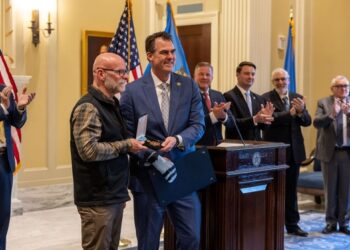OKLAHOMA CITY (OBV) – A bill that restricts virtual education in Oklahoma schools has made its way to Gov. Kevin Stitt’s desk for final approval.
Senate Bill 758 restricts virtual days in schools to no more than two per school year. The bill passed the Oklahoma House of Representatives on Tuesday with a vote of 53-32.
SB 758, written by Sen. Kristen Thompson, R-Edmond, and House Speaker Pro Tempore Anthony Moore, R-Clinton, limits virtual classroom education to incidents of inclement weather, staff shortages, illness and building maintenance issues. Virtual learning can also occur when deemed necessary by school administrators and approved by the State Department of Education.
“Kids learn best in the classroom,” Thompson said. “Virtual days have their place in emergencies, but we’ve seen them become a go-to solution in some districts — and that’s not fair to students or families. This bill strikes the right balance by preserving flexibility without compromising the quality of education.”
The bill also mandates the State Department of Education to begin publishing an annual report by June 30, 2027, detailing the use of virtual education in Oklahoma schools. The report will be published online and provided to the governor and legislative leaders.
Senate President Pro Tempore Lonnie Paxton, R-Tuttle, championed SB 758, previously saying that remote learning is an insufficient educational experience.
“Our students deserve a high-quality education, and that begins with ensuring in-person learning remains the foundation of our school system,” Paxton said. “Virtual instruction should be a tool for emergency situations, not a substitute for the critical, hands-on learning experiences that take place in the classroom. Senate Bill 758 provides the necessary guardrails to keep our schools focused on direct engagement between students and teachers while maintaining a degree of flexibility for truly exceptional circumstances. This is about striking the right balance to ensure that students, parents and educators can rely on a strong and structured learning environment.”
Stitt criticized virtual education during his State of the State address in February.
He said some Oklahoma school districts require that students be in the classroom only 148 days a year. He compared that number to Kansas, which requires students be in school 186 days a year.
“We all know that kids learn best when they’re in the classroom,” Stitt said. “It’s just common sense.”
Virtual learning became commonplace across Oklahoma and throughout the nation during the COVID-19 pandemic. Schools went virtual and many office employees worked remotely to minimize coronavirus’ spread.
Stitt spoke about virtual learning during a news conference in February, saying that students need to be in the classroom so they can get the education they need to either prepare for college or entry into the workforce upon graduation.
“We all know that having kids in the classrooms with our wonderful teachers is a is a must,” he said.
Education experts have found that virtual learning can be detrimental to children’s academic experience.
Harvard professor Stephanie Jones and Lecturer Emily Hanno conducted a study on childhood development, tracking children’s virtual learning experience during the pandemic.
Families who participated in the study said their children — young, elementary-age kids especially — experienced a rise in temper tantrums, anxiety and a poor ability to manage emotions.
“Parents reported that their children’s behaviors at home were worse during remote learning than during in-person learning,” the study states. “The results illustrate that parents perceived their children’s behaviors as having shifted systematically through the COVID-19 pandemic’s educational interruptions.”
The University of California, Davis, also conducted a study on virtual learning’s effects on students.
The change from a classroom setting to learning at home caused many students to experience undue stress, low levels of social inclusion and low satisfaction with school. Some students suffered mental health issues, according to the UC Davis study.

















